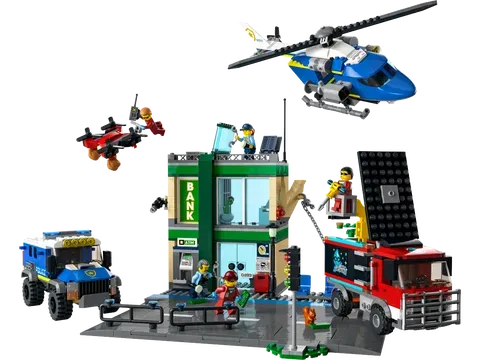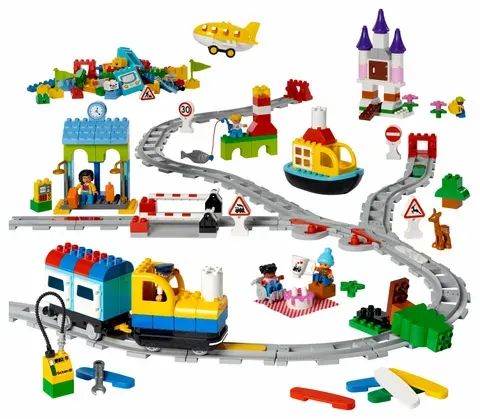
Police Chase at the Bank City LEGO
“Play is one of the most important aspects of a child’s life. Why? Because through peekaboo, patty-cake, and playing house, children learn to think creatively and interact socially.
Through play, they develop physically and discover a slew of emotional skills,and they learn how to process the world. In short, play is pivotal to your child’s development.” Kimberly Zapata, Healthline
Cognitive benefits
 EV3 Intelligent Brick MINDSTORMS®
EV3 Intelligent Brick MINDSTORMS®
“Young children learn how things fit together through play. It allows them to use their senses and encourages exploration and curiosity, and these skills are the foundation of intellectual development and cognitive processing.”
When playing with Lego, your creativity is only limited by your own imagination! Lego gives children the opportunity to let their imagination run wild and explore their creativity without fear of failure. Children will also discover what they are able to create when they can play without restraint.” Kimberly Zapata, Healthline
“Never thought Lego had so many benefits on top of keeping your kids amused for hours? You aren’t alone!
Overall, the skills that children learn though playing with Lego are hugely beneficial for early learning and childhood development. Lego teaches various soft skills that will shape the way that they work and interact with others including, creative thinking, teamwork, communication, conflict resolution and problem-solving skills.
 LEGO® 4+ sets pack all the fun of everyday
LEGO® 4+ sets pack all the fun of everyday
When you’re looking for the next toy to add to your child’s collection, perhaps give Lego a second thought. Come in and speak to the friendly team at Toyworld and they will help you find the perfect set!” The Barossa coop
Physical benefits
Physically, play benefits children in a few ways, namely in the development of their fine and gross motor skills.
“Play benefits motor development by encouraging movement [and the] understanding of spatial relations, promoting motor planning skills, and supporting balance and dexterity,” Mendez says. “It also supports gross motor skills, such as energy, stamina, flexibility, and body awareness.”
Examples of physical play include running, jumping, swimming, block building, dancing, riding bikes, and climbing trees. (When you’re providing opportunities for these types of activities, remember key safety precautions — from bike helmets to pool supervision.)
Social benefits
Play is also important for social development because it helps children learn how to interact with others.
Through play, children develop an understanding of social expectations and rules, and play provides opportunities to share thoughts and ideas, to listen, and to compromise.
Everyone has experienced the trauma that follows the accidental destruction of a carefully constructed Lego tower… Initially the effects of this are often devastating, however, encouraging children to start again and not give up will build their resilience and teach them to persevere when unfortunate situations occur. It might sound ridiculous, but learning these skills from a young age has proven benefits in later years!
Emotional benefits
Additionally, play helps children understand and process their emotions. “Kids process their emotions and new concepts through play,” Kim Wheeler Poitevien, a child therapist in Philadelphia, said. When a child loses a game, for example, they learn to process sadness, anger, and grief. Playing also helps build confidence and encourages the development of their identity and self-esteem.
Everyone has experienced the trauma that follows the accidental destruction of a carefully constructed Lego tower… Initially the effects of this are often devastating, however, encouraging children to start again and not give up will build their resilience and teach them to persevere when unfortunate situations occur. It might sound ridiculous, but learning these skills from a young age has proven benefits in later years!
Educational tablet
“
It's no surprise that kids are always begging to play a game on their parents' tablets or cell phones — adults are always on them! That's why tablets for kids exist: so you don't have to worry about handing them your precious iPad, only to find that it breaks the second they drop it. These kid-friendly tablets are often similar to regular versions, except they're often more durable, offer parental controls for content and screentime and come with educational apps for kids.
When shopping for a kid-friendly tablet, there are two important things to look for: storage and parental controls. Kids love to load up on apps and photos, which can eat up the internal storage space quickly. If you plan on downloading a lot of content (like videos, games or additional apps), look for a tablet for kids with at least 16GB of storage. More storage is better, but it also increases the price. If you an expand the storage with an external SD card, that's a bonus.
Parental controls allow you to manage how your kid uses the tablet, whether that's limits on screen time or restrictions on content. Look for tablets that will filter out content based on age, have parent apps that let you keep tabs on what your kids are using or lock after a certain amount of time. Some tablets give parents more control, others take care of the filtering and allow parents to be more hands-off.
At what age should you give your child a tablet?
The American Academy of Pediatrics (AAP) recommends avoiding digital media for kids under 18 months, with the exception of video chatting. (You gotta let Grandma and Grandpa see the baby.) For kids 18 months and older, the AAP says the ideal is to limit screen time to one hour per day. But more than that, the quality of the screen time is important: The organization urges parents to choose high-quality, educational content and play or watch with them as much as you can. Parents should also make sure that screen time doesn't interfere with sleep or physical play.” RACHEL ROTHMAN, GOOD HOUSEKEEPING INSTITUTE AND MARISA LASCALA
Conclusion
Play is one of the most important aspects of a child’s life. Through play, they develop physically and discover a slew of emotional skills,and they learn how to process the world. The benefits of Lego play are cognitive, physical, social, emotional. Kid-friendly tablets are often similar to regular versions, except they're often more durable, offer parental controls for content and screentime and come with educational apps for kids. Finally so, parents are the last word about what is the best for their children.
To thank you for reading this article, we offer you LEGO® Life Magazine free; if your child is between the age of 5 and 10; using this QR code:
.png)
